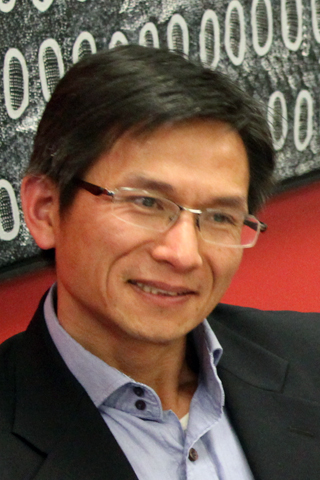
Director, Frontier AI Research Centre
ARC Future Fellow (Level 3, professorial level)
School of Computing, Faculty of Science and Engineering, Macquarie University
Adjunct Professor, UTS Data Science Institute (former, Advanced Analytics Institute)
ACM Distinguished Scientist
Editor-in-Chief, IEEE Intelligent Systems
Founding Editor-in-Chief, Int. J. of Data Science and Analytics
Business email: MQ: Longbing.Cao(a)mq.edu.au
Executive CV: in 中文 or in English
MQ staff profile
UTS staff profile
ACM profile
IEEE profile
Google Scholar
ORCID
DBLP publications
LinkedIn
Qualifications:
PhD in Computing Science, University of Technology Sydney, Australia
PhD in Pattern Recognition and Intelligent Systems, Chinese Academy of Sciences, China
Master in Data Communication Systems, China University of Mining Technology (Beijing), China
Bachelor in Electrical Engineering, Fuxin Mining Institute (now Liaoning Technical University), China
Working experience:
Leadership: Longbing is the Distinguished Chair in AI, the director of FSE Research Centre for Frontier AI Research at Macquarie University, and an Australian Research Council Future Fellow at the professorial level. He has got mixed leadership experiences as a CTO and then a major university research institute director. He was a full professor in information technology at UTS since 2009, and the Founding Director of the university’s research institute Advanced Analytics Institute since 2011. He joined UTS in 2005 after he served as an editor, marketing strategist, deputy director and then Chief Technology Officer in Beijing. He was also the Research Leader of the Data Mining Program at the Australian Capital Markets Cooperative Research Centre. He has been a Senior Member of IEEE, SMC Society, and Computer Society since 2006, he is a member of ACM and the American Statistical Association.
Research: He has been diligently and perseveringly devoted to advanced analytics and complex intelligent systems for decades in both academia and industry and has been highly motivated to cohesively promote high-quality original research, high-calibre data scientist education, and high-impact enterprise development primarily driven by their identified real-world common and significant challenges, and to significantly transform business and productivity based on solid and original pure and applied research.
Impact: In the recent 30 years, building on his mixed experience in industry and academia, his main efforts have been made on bridging the gaps between data science fundamental research and best practice for enterprise data science innovation. He and his team have been collaborating with many large government and business organizations in Australia and overseas in over 10 domains, including several areas of government services (e.g., social security, taxation, financial services, intellectual property, immigration, and city management, etc.), finance, insurance, banking, telecommunication, transportation, health and medical services, education, e-commerce, publication and media, marketing, and airline business, etc. Their decades of effort on enterprise analytics innovation and best practice laid the foundation for the University’s leadership and impact recognition in data science, leading to high socio-economic impact and benefits mentioned in major media, government and global organization’s reports and significant (in billions of dollars) savings for the business, government, and society.
Recognition: His leadership in data science was recognized by the 2019 Eureka Prize for Excellence in Data Science. He was named an ACM Distinguished Scientist for his contributions to Data Science and Analytics.
Research interest:
Intelligence and system complexity understanding: Including behavior intelligence, data intelligence, domain intelligence, human intelligence, machine intelligence, network intelligence, organizational intelligence, and social intelligence, etc., as well as their metasynthesis.
Data and behavior complexity understanding: All sorts of data and behavior characteristics and complexities in large-scale transactions, images, videos, text, documents, and behaviors; and in mixed, multimodal, multisource, dirty, sparse, and high-dimensional data.
Featured areas: Foundations of data science in particular non-IID learning (including coupling learning, interaction learning, and heterogeneity learning) in big data, behavior informatics, agent mining, domain driven data mining, actionable knowledge discovery, and complex intelligent systems.
General interests: Including data science, machine learning, deep learning, data mining and knowledge discovery, applied analytics, applied statistics, natural language processing and document analysis, recommender systems, and artificial intelligence and complex intelligent systems.
Professional services:
In data science, he has initiated a series of activities since 2005. In 2007, he established the Data Science and Knowledge Discovery lab at UTS. In 2009, he started the Big Data Summit in Australia. In 2011, he founded the Advanced Analytics Institute at UTS which was the only group mentioned in several government papers. In 2011, he established the world’s first analytics research degrees: Master of Analytics (Research) and PhD in Analytics. In 2013, he founded the IEEE Task Force on Data Science and Advanced Analytics (DSAA), and IEEE Task Force on Behavior, Economic and Socio-cultural Computing, and IEEE Task Force on Educational Data Mining. In 2014, he established the IEEE Conference on Data Science and Advanced Analytics (IEEE DSAA) and the International Conference on Behavior, Economic and Socio-cultural Computing, and the ACM SIGKDD Australia and New Zealand Chapter. In 2015, he started the Int. J. of Data Science and Analytics (JDSA, with Springer) and Book Series on Data Analytics.
He was the founding Editor in Chief of Int. J. of Data Science and Analytics (JDSA, Springer), the series editor of the Book Series on Data Analytics (Springer), and the Editor in Chief of IEEE Intelligent Systems. He serves as an associate editor and on editorial boards of such journals as ACM Computing Surveys and Machine Learning, and as conference general chair for such as KDD2015 and program co-chair, area chair and vice-chair of conferences such as IJCAI, DSAA, PAKDD and ICDM, and SPC/PC member on over 100 conferences.
Prof Cao is the Steering Committee Chair of PAKDD and IEEE DSAA.
